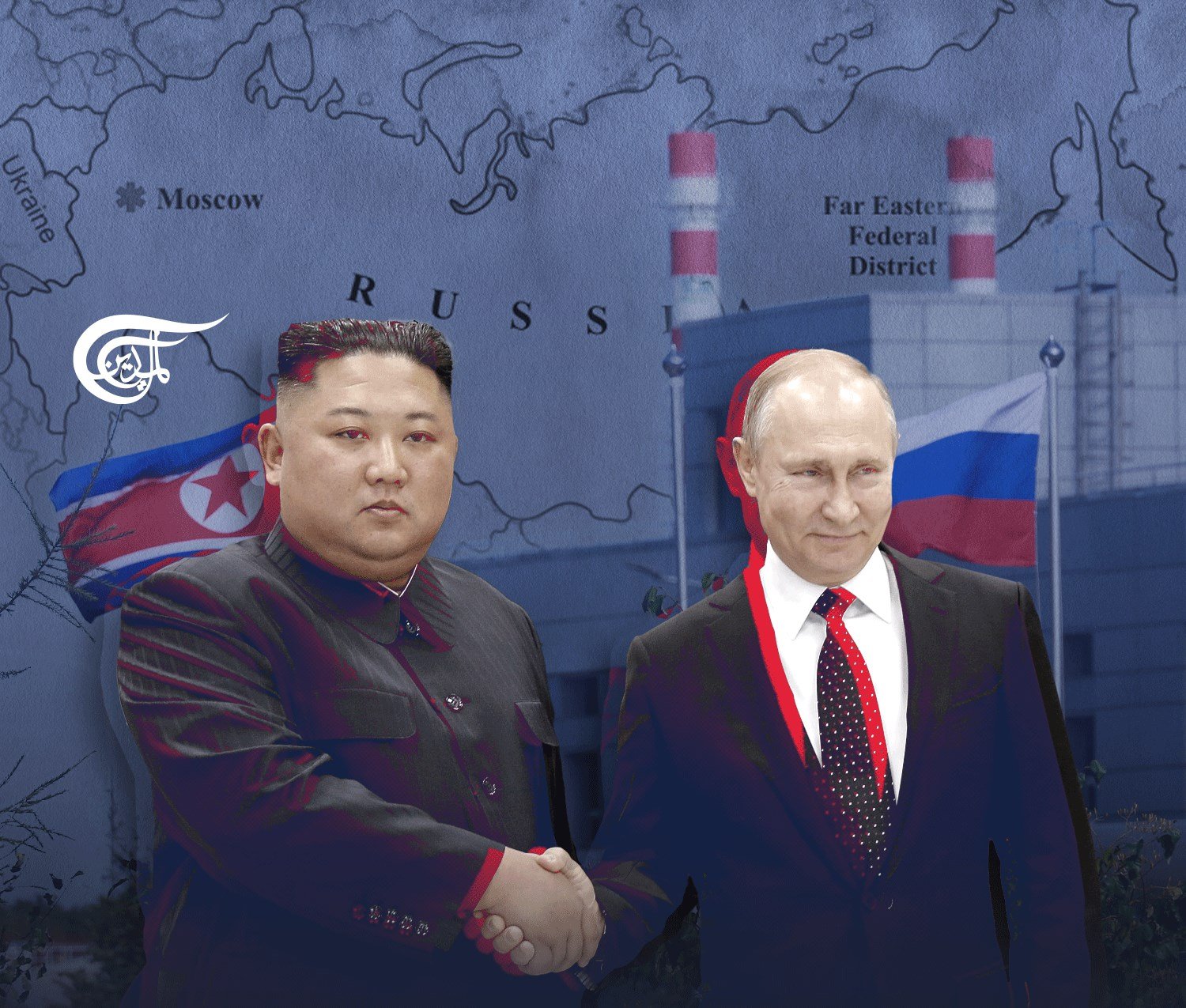Vladimir Putin’s meeting with Kim Jong Un: Impact on global politics
The relations between these two nuclear-armed nations will no doubt continue to develop in a positive trajectory, however, how the West will react to this is not easy to predict.
-

The impact of a Putin-Kim meeting on global politics (Illustrated by Mahdi Rtail, Al Mayadeen English)
In the depths of the Russian Far East, two of the most recognized, and for some, the most threatening, leaders of nuclear-armed nations greeted each other warmly.
The meeting between Kim Jong Un and Vladimir Putin took place on the 13th of September, in the far east of Russia, in the Amur oblast. What does this meeting signify for Russia and the DPRK themselves, and what impact does it have on the collective West?
This meeting is considered to be significant for the relationship between Russia and the DPRK. The DPRK is a strong supporter of Russia and the Russian President. Kim Jong Un was one of the first leaders to express his unconditional support for Putin. This meeting was an opportunity for the DPRK to develop economic and military ties with Russia, which is critical given the vast array of sanctions that the US has placed on the DPRK. The DPRK has also been placed under sanctions by the European Union, with the collective West following the lead taken by the USA with its disdain for the DPRK.
For Russia, this meeting was important for a number of reasons. Firstly, the DPRK shares a border with Russia (albeit a small 17km stretch of border). It is therefore a neighboring country of Russia, making it in the latter's interest to develop friendly relations with it for its national security interests. Secondly, developing relations with the DPRK gives Russia a degree of leverage in terms of political diplomacy, especially given the DPRK’s relations with countries like China. It also comes under the ever-growing list of countries that Russia is trying to add to its list of “friendly nations”, which is imperative for Russia politically, given the threat it faces from the countries it deems “unfriendly”. Furthermore, there has also been some emphasis on the ability of the DPRK to supply weaponry to Russia that it can use in the ongoing conflict with Ukraine.
The meeting between the two leaders drew criticism from the West, especially in terms of a potential supply of weaponry to Russia for its war in Ukraine. The West also condemned the meeting as an act of desperation by Putin. Yet, the impact of this meeting does have various consequences on the Western circle.
Firstly, it demonstrates the ability of countries, condemned by the West, to successfully engage in diplomacy and forge relationships between themselves, despite facing condemnation. The art of diplomacy is to maintain relations with supporters, but also opponents, something Western leaders have failed to do with regard to the DPRK and Russia. The blossoming diplomatic relationship between Putin and Kim Jong Un also undermines and, to some extent, mitigates the sanctions imposed by the West to coerce governments. Both Russia and the DPRK have faced a barrage of sanctions and are considered in the top five most sanctioned countries. Yet, economically speaking, if they are able to mitigate the impact of these sanctions through the development of trade and relations with other sanctioned nations, the impact of Western sanctions themselves is reduced.
Secondly, this meeting shows just how far leaders are willing to go to form relations outside of the West. Despite the DPRK being one of the most isolated and secretive nations in the world, the Russian President made time to meet and hold diplomatic talks with the DPRK leader. The fact that both the DPRK and Russia are considered [by the West] "pariah states" pushes the relations between these nations even closer together in the face of international condemnation. This, therefore, poses a greater threat to the national security of Western nations themselves, with nuclear-armed nations, considered to be "dangerous", engaging with one another and forming strategic alliances.
Thirdly, this meeting demonstrates the possibility of leaders who have faced condemnation by the West still managing to maintain positions of power within their country. Yet, in both the cases of the DPRK and Russia, the leaders of these nations, contrary to the wishes of certain individuals, have remained in power. This demonstrates the evolving change in power globally and the reduction in the influence of Western hegemony around the world.
The ability of Vladimir Putin and Kim Jong Un to meet and successfully engage with one another against the backdrop of international condemnation is significant, not purely for the countries themselves, as it has wider ramifications for geopolitics and international diplomacy. The relations between these two nuclear-armed nations will no doubt continue to develop in a positive trajectory. However, how the West will react to this is not easy to predict.

 Natalie Jones
Natalie Jones
 5 Min Read
5 Min Read











